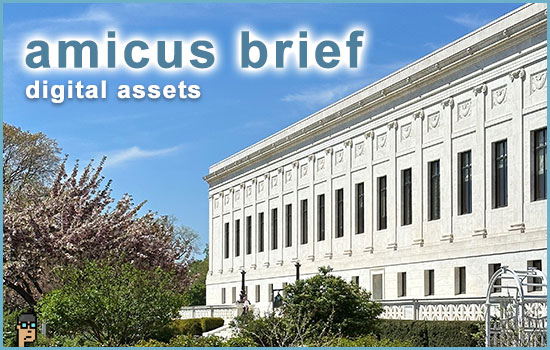Here’s today’s blockchain tipsheet… prefer it by email? Sign up here.
amicus future
Increasingly, the future of U.S. digital assets appears to be playing out in the courts rather than through legislative action. Grayscale, Ripple, Wahi… and now in the case of ongoing industry concerns about the sanctioning of crypto mixer Tornado Cash by U.S. Treasury and what it represents, industry orgs DeFi Education Fund and Blockchain Association put their legal team to work on an amicus brief.
In a Twitter thread, DeFi Education Fund explains: “In the brief, we argue that OFAC’s sanctioning of Tornado Cash reflected ‘a basic misunderstanding of what Tornado Cash is and how it works,’ and that the decision ‘is both unprecedented and unlawful’ under the [Administrative Procedure Act].” Read the thread.
more tips:
Amicus Brief in support of Tornado Cash Brief of Blockchain Association and DeFi Education fund as Amici Curiae in Support of Plaintiffs’ Motion for Partial Summary Judgment (PDF) – DeFi Education Fund
What is amicus curiae? – law.cornell.edu
debating CBDCs
Rep. Warren Davidson (R, OH) and Rep. Bill Foster (D, IL), both members of the House Financial Services Subcommittee on Digital Assets, Financial Technology and Inclusion, explore different facets of the Central Bank Digital Currency (CBDC) opportunity/threat – depending on your point-of-view – in a 7-minute informational video on A Starting Point.
Addressing the pros and cons of CBDCs, Rep. Davidson was unsurprisingly the stronger skeptic given most Republicans anti-CBDC stance to-date, but Rep. Foster offered his own reservations as well:
(lightly edited for clarity)
Rep: Davidson: “The good thing about the government creating a cryptocurrency is … the government doesn’t need to. There are already great options.”
“If you look at Bitcoin… A lot of people will conflate crypto with a Central Bank Digital Currency, and they don’t really understand the difference. Blockchain – made popular by Bitcoin – is permissionless. The idea that the blocks move and validate the transaction, the whole ledger is public, but the keys are private and establishes trust in a different way.”
“It’s a different way to establish security and it does it specifically to make sure that there is no third-party intermediary: not a bank, not a central bank digital currency, not a Federal Reserve, no federal government and no creepy surveillance state system.”
Rep. Foster: “The pros have to do with the efficiency of transactions. There are huge advantages to be able to transact… just get out your wallet, prove you are who you say you are, have access to the to the digital currency wherever it’s stored. And then transfer it. And this is tremendously important.”
“Transactions aren’t cheap in our country. 70% of our GDP is consumer consumption. And that is very inefficient when you look at other countries.”
“Credit cards, for example, take about a 2-3% ‘bite’ out of all transactions – the customer ultimately pays for that. The corresponding number is much less than 1% in other countries where they have set up systems like this or very large, state-backed systems. There’s not much that China does better than we do, but this is one thing they do – their transaction efficiency is much better than ours.”
global regulation vs US regulation
The International Monetary Fund has published its Global Financial Stability Report for April 2023. The risks of cryptocurrency and its “interconnectedness” properties are featured repeatedly including lessons learned from the FTX implosion, Silicon Valley Bank and Signature Bank. The IMF stresses that, ultimately, it’s not about creating country-specific crypto regulation -rather, regulation needs to be global. “Strong international cooperation, supported by robust, comprehensible, globally consistent crypto regulation, is essential to provide guidance, ensure consistent implementation, and contain spillover risks.” Read more.
more tips:
Global Financial Stability Report for April 2023 (PDF) – imf.org
blockchain analytics
In an oddly titled article, “The U.S. Cracked a $3.4 Billion Crypto Heist—and Bitcoin’s Anonymity” (the public ledger of Bitcoin is pseudonymous at best), The Wall Street Journal looks at the Silk Road heist of 50,000 Bitcoin in 2012 by James Zhong. Blockchain analytics firm Chainalysis is one of the main attractions of the article featuring CEO Jonathan Levin who says, ““If there’s one thing the blockchain does really well, it preserves evidence perfectly.” Read more.
use case – digital ID
Utah Governor Spencer Cox (R) signed a bill aimed at taking the first steps toward a digital ID using blockchain technology. H.B. 470 “Government Digital Verifiable Record Amendments” requires the state’s Division of Technology Services “to provide recommendations to government entities on how to issue a digital ID or other record through distributed-ledger technology.” Read more on State Scoop.
more tips:
H.B. 470 – Utah.gov
use case – settlement
Financial firms Cumberland, WisdomTree Inc. and Wellington Management Group LLC , are tapping the Avalanche blockchain and testing a new way to enable financial trade execution and settlement on the blockchain using an application called Spruce. A press release reads, “The Spruce testnet is meant to enable buy- and sell-side institutions to engage with public blockchain infrastructure in a low-risk, low barrier-to-entry manner.” Read the release.
still more tips
The metaverse’s *really* early adopters – Politico
How Shapella Pushes Ethereum Forward – Bankless
Bankrupt crypto exchange FTX has recovered $7.3 billion in assets – Reuters
The great tech reshuffling: Hubs outside Silicon Valley are thriving – The Washington Post
If you would like this delivered as a newsletter, please sign up here.

